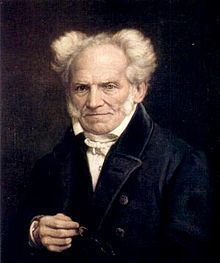Summary of Schopenhauer’s Pessimism

I have written in some detail about Arthur Schopenhauer (1788 – 1860), who was a German philosopher known for his atheism and pessimism—in fact he is the most prominent pessimist in the entire western philosophical tradition. Schopenhauer’s most influential work, The World as Will and Representation, examines the role of humanity’s most basic motivation, which Schopenhauer called will. This will is an aimless striving which can never be fully satisfied, hence life is essentially dissatisfaction. Moreover consciousness makes the situation worse, as conscious beings experience pain when thinking about past regrets and future fears.
He concluded that desires cause suffering. Consequently, he favored asceticism—a lifestyle of negating desires or a denying the will similar to the teachings of Buddhism and Vedanta. In its most extreme form, asceticism leads to a voluntarily chosen death by starvation, the only form of suicide that is immune to moral critique.
Schopenhauer’s overall pessimism can be seen in his claims that:
(1) existence is a mistake;
(2) there is no meaning or purpose to existence;
(3) the best thing for humans is non-existence;
(4) life is essentially suffering and suffering is evil;
(6) this is the worst of all possible worlds.
Of course many, like Nietzsche, argued that Schopenhauer’s view of the world says more about him than it does about the world. Moreover, Nietzsche argued that Schopenhauer’s asceticism and denial of Will were self-defeating. For to will nothingness was still a willing. Schopenhauer was willing nothing, rather than not willing at all. Thus Nietzsche argued that Schopenhauer advocates a kind of “romantic pessimism.” Schopenhauer desired or willed nothing so as to achieve tranquility and peace. In contrast to Schopenhauer, Nietzsche adopted a philosophy that said yes to life, fully cognizant of the fact that life is mostly miserable, evil, ugly, and absurd.



